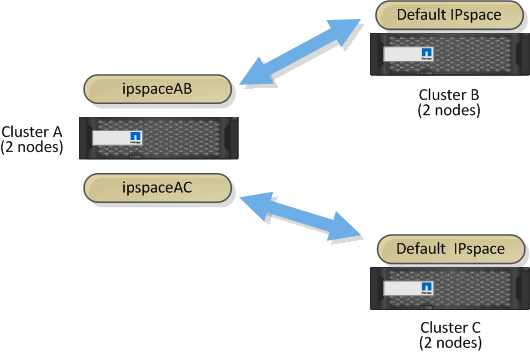Use custom ONTAP IPspaces to isolate replication traffic
 Suggest changes
Suggest changes


You can use custom IPspaces to separate the interactions that a cluster has with its peers. Called designated intercluster connectivity, this configuration allows service providers to isolate replication traffic in multitenant environments.
Suppose, for example, that you want replication traffic between Cluster A and Cluster B to be separated from replication traffic between Cluster A and Cluster C. To accomplish this, you can create two IPspaces on Cluster A.
One IPspace contains the intercluster LIFs that you use to communicate with Cluster B. The other contains the intercluster LIFs that you use to communicate with Cluster C, as shown in the following illustration.

Related information


